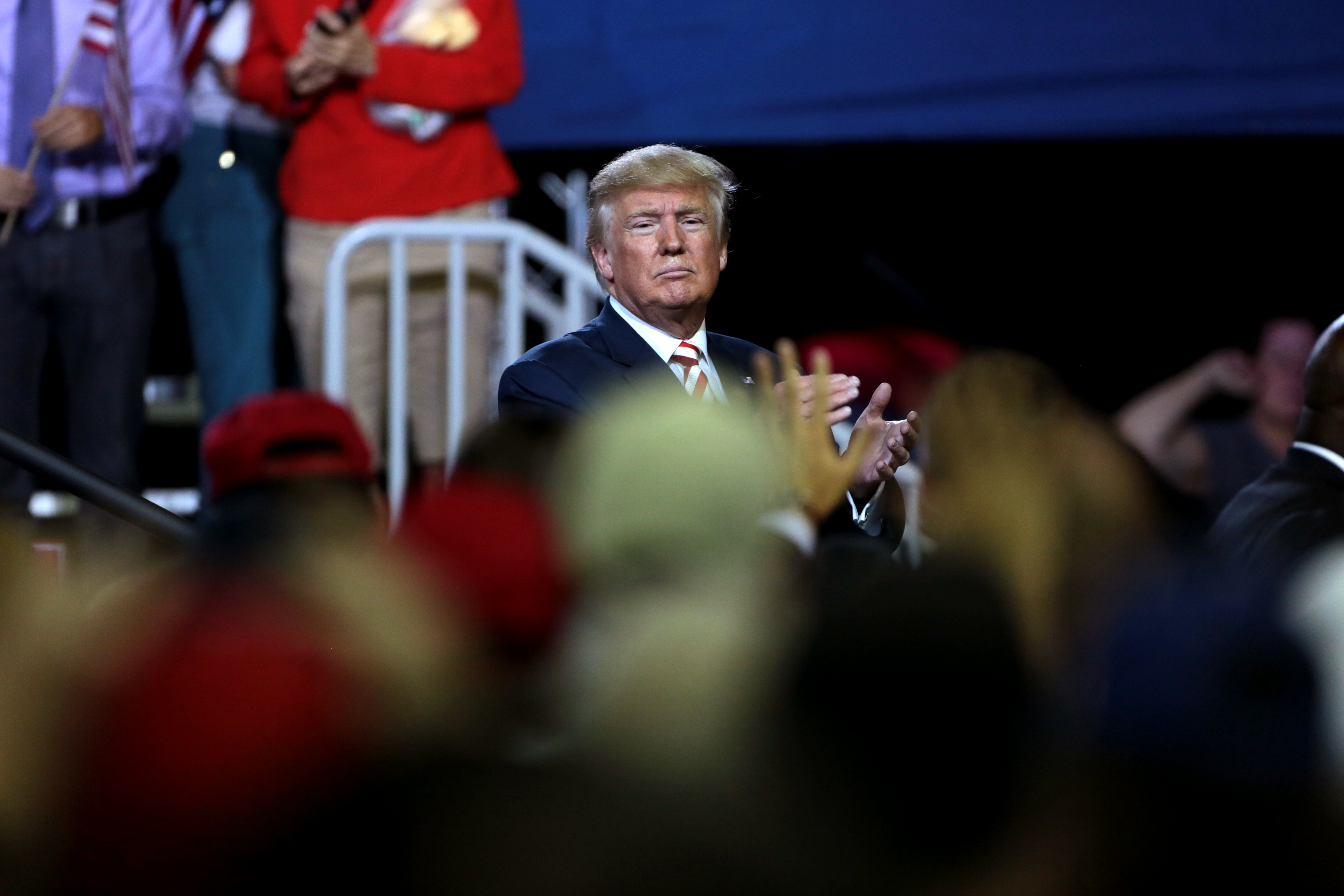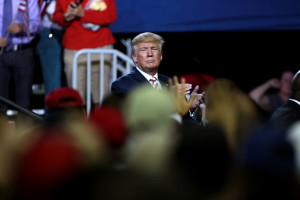Trump v. United States (2017): An Assault on Democracy
 Trump in Arizona http://tinyurl.com/jqfoq67
Trump in Arizona http://tinyurl.com/jqfoq67

Last February, I authored a piece describing how anti-establishment rhetoric in the 2016 election primaries would not drastically alter American political parties in the long term. Due to extreme political polarization across the American political landscape and the lack of realignment catalysts, I argued, a new era of political parties in the U.S. would not occur.
Looking back, it becomes evident that much has changed in the past ten months. Back then, little did we know the turn this election would take, or the overall unprecedented nature of events during this election cycle. The idea that this election cycle could threaten American democracy itself —not just the current party system— never even crossed my mind until recently.
Throughout Donald J. Trump’s campaign, allusions to less-than democratic actions and rhetoric have continually caused public outcry and media attention. The comments Trump made during the final presidential debate on October 19th are surely enough to justify making every major newspaper headline. The sheer size of the media storm that descended on the Trump campaign for his refusal to state that he will accept the outcome of the election is well warranted. However, we would be mistaken to not take into account the long history of Donald Trump’s incendiary statements which allude to the mindset of a man who has no fear of undermining American democracy as a whole as long as it benefits himself.
Trump’s history of questioning the democratic decision-making process, sowing seeds of non-acceptance of electoral results, and being more than welcoming of undemocratic means to his preferred ends has been well documented. Trump’s repeated statements praising far-from-democratic Putin for his favorability ratings, leadership skills, and “great control over his country” clearly demonstrate Trump’s inability to compare and contrast core principles of democratic deliberation with authoritarian governance. Trump’s uncontrolled statements, such as those encouraging staunch Second Amendment supporters to take action against a President Hillary Clinton or those saying that as president he would jail his former opponent, show Trump’s absolute failure to understand what actions are appropriate within democratic political systems. Trump’s very policy proposals —ranging from religious tests to enter the country, to stop-and-frisk policing, to Muslim “databases,” all the way down to minutia like “opening up our libel laws” — enlighten us on the disrespect (or at least sheer ignorance) Trump has of the constitutionalism inherent in modern democracies. These statements and actions are diametrically contrary to the principle of constitutional democracy in the United States.
His rhetoric pushing the classic “voter fraud” trope to the extreme is perhaps the best example of Trump’s lasting impact in undermining American democracy. By fear-mongering that massive voter fraud tactics and foreign meddling in the process are afoot, Trump has caused paranoia within his base. His statements have amplified unfounded claims about voter fraud and have worked to mobilize his staunch supporters at the expense of the integrity of the American democratic process. By failing to state that he will recognize the results of the election and by sowing seeds in his supporters’ heads that democratically conducted elections are illegitimate, Trump is setting an example for the American public that electoral results are only legitimate if one’s preferred candidate wins. This is not what democracy is.
The Democratic National Convention speech of Khizr Khan, father of a fallen U.S. Army Captain, spurred a constitutional debate about Trump’s policy proposals. http://tinyurl.com/zdmbbmq
This mythic campaign against voter fraud demonstrates very well the ways in which Trump has repeatedly challenged the integrity of elections, characterized the entire system as “rigged,” and hinted toward not abiding by the result of the process. By doing so, Trump has already undoubtedly created lasting negative impacts on future elections in the form of trust in government and elected public officials.
Now, a distinction must be made in regards to Trump’s comments about a “rigged” system. Some voters might be quick to parallel Trump’s diction with that of Bernie Sanders. After all, both candidates’ campaigns have featured heavily the idea of a “rigged” system —be it economic, electoral, or otherwise— present in the United States. It is well known Sanders structured his campaign as a fight by the less-fortunate against a “rigged” American economic and criminal justice system which works for the most privileged Americans. His proposals to correct these systems took the form of using the current political and electoral structure to reform the tax code, to propose programs to combat institutional bias and mass incarceration, and to pass a constitutional amendment to overturn Citizens United.
As opposed to Sanders’ proposals to fix the system, however, Trump’s policies stem not from constructive criticism of the system but from a desire to violently overturn the system through undemocratic means. Trump’s proposed way of engaging in politics subvert the democratic processes of today’s American constitutional framework. His declarations are awash with actions that would be either unconstitutional or impossible within the scope of democratic government.
Outlining serious issues in the American political and economic systems and mapping forward clear, constitutional ways of reforming these systems does not equate to threatening to directly undermine these institutions and processes, and it certainly does not equate to refusing to abide by the institutions and accept their outcome when things do not go one’s way.
In the end, the reasons not to vote for Trump remain multifaceted. His foreign policy proposals as they stand now are vague declarations with possible destabilizing effects on the American diplomatic and military worlds. His tax cuts and spending increases combined would add $8.5 trillion to the national debt over the next 10 years, much more than Clinton’s proposals, which would actually decrease the debt by $1.5 trillion, according to the independent Tax Policy Center. His demonstrated inability to control what he says and to refrain from being baited to angrily respond would without a doubt plague a free-reined Trump presidency with public scandal.
However, after looking at all considerations facing voters on November 8th, we as Americans must prioritize the most important factor in any election: the basic principles the United States was founded on. All the talk lately revolves around the danger that a Trump presidency would be because of his temperament, policy proposals, and very public scandals. Left out of the equation, however, is the danger that the Trump candidacy and a Trump presidency pose to American democracy as a principle, as a beacon of hope for the world since 1789, and as the foundation for American society as we know it today. By questioning the democratic process itself, Trump has outed himself as one of the most unpatriotic, undemocratic, and un-American candidates in the history of American elections. The stakes cannot be higher.
For the first time in history, democracy itself is on the ballot. Let’s make sure to check the right box.
